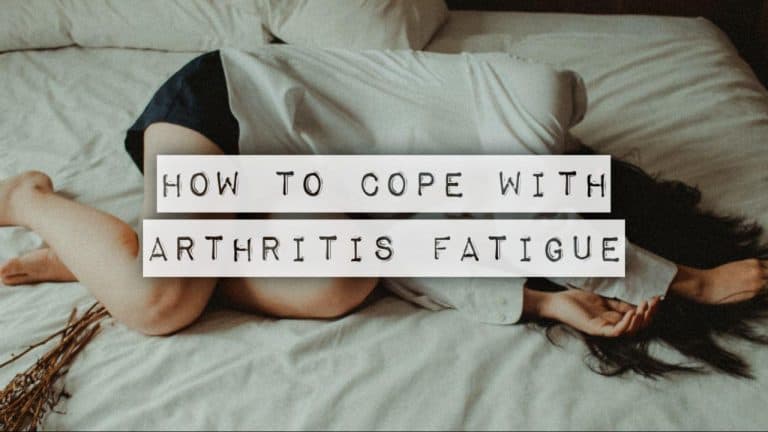With over 1 million orders

DO YOU EXPERIENCE FATIGUE BECAUSE OF YOUR ARTHRITIS?
Fatigue is an ever-present and persistent challenge when you have arthritis. While it can sometimes be caused by inflammation, arthritis disease activity or pain; it can also be caused by other contributing factors such as limited physical inactivity, sleep disruptions, depression, or weight changes.
Recognizing the possible causes of your fatigue is important as this will be critical to you regaining your vigor and managing your fatigue better, despite your illness.
Here are some possible causes–
Medication Side Effects
Medications, including those that you may be taking for your arthritis are known to cause drowsiness and fatigue. Some DMARDs such as azathioprine and methotrexate, NSAIDs, blood pressure medication, and narcotic pain relievers are common culprits. Corticosteroids also contribute to fatigue because it tends to keep you up at night.
Limited Activity
Pain is a common symptom for arthritis patients. As a result, arthritis sufferers tend to hold back from physical activity. The more inactive you are however, the more overwhelming the feeling of exhaustion becomes. Unused muscles, including the heart muscle, can weaken, leading to you getting tired faster.
Anemia
Statistics say that up to two-thirds of arthritis sufferers also have a condition called anemia of chronic disease—which is caused by inflammatory chemicals interfering with the body’s natural production of red blood cells. A shortage of red blood cells can cause muscles to get tired easily, which leads to fatigue.
Lack of Sleep
Sleep is a challenge for many arthritis sufferers. The discomfort of swollen and stiff joints, chronic pain, and medication side effects tends to interfere with your ability to get restful and refreshing sleep. Sometimes, it can lead to insomnia that leads to fatigue.
Obesity
A combination of lack of physical activity and medication side effects often lead to weight gain and additional weight problems. This can sometimes contribute to fatigue.
Poor Nutrition
When you’re not getting enough healthy food and fluids, your body could experience vitamin deficiency and dehydration, which could manifest as fatigue.
Depression
Arthritis can take you away from doing a lot of things that you used to love. Additionally, the stress of dealing with a chronic illness can affect your hormones and brain activity that could lead to depression. One of the most telling signs of depression is fatigue.
Fatigue caused by arthritis can be unpredictable. It can start any time of the day, can sometimes last from the moment you wake up to when you end the night, an hour, or even for several days. When it does, you feel an extreme, sometimes overwhelming feeling of physical and mental tiredness—one that can’t be remedied by getting more rest or sleep.
A combination of lifestyle changes and medication can help you manage your fatigue better.
Medication
Anemia Medications
If your fatigue is being caused by anemia, additional iron supplements may help improve the symptoms of fatigue.
Sleep Aids
Sleeping pills could help promote better and more restful sleep, particularly if your fatigue is being caused by depression or insomnia. Talk to a trusted physician about what possible medications are available for you.
Vitamins
If your fatigue is caused by a poor diet, it’s likely that your fatigue is caused a vitamin deficiency. Speak to your doctor about it—they may be able to prescribe vitamins or supplements to help fill in nutritional gaps and boost your overall wellness and give you a boost of energy.
Psychoactive Medications
Talk to your doctor if you could potentially benefit from medications that are meant to increase energy.
Lifestyle Changes
Incorporate More Exercise In Your Daily Routine
Exercise can help build muscle mass, boost strength, improve blood circulation and flexibility—all of which are known to boost energy and minimize pain symptoms.
Drink Water Regularly
Dehydration is an often overlooked cause of fatigue. Be sure to get your fill of fluids daily.
Eat Better
Your body requires nourishment. Add plenty of fruits and greens in your diet and get adequate protein and healthy fats. Avoid sugary and high salt foods and start your day with meals that include lots of lean protein and complex carbohydrates to serve as a source of energy.
Meditate
If anxiety or depression is causing your fatigue, try meditation to help reduce stress and calm your thoughts.
Support Your Joints
Wearing joint supports (such as elbow supports and knee supports) and using tools when necessary can help ease the stress on your joints as well as ease the pain associated with your illness, thus helping with fatigue.
Take Breaks When You Need It
It’s important to remain active, but listen to your body and rest when you need it. Rest allows your muscles to recover and refuel for more activity.
Do you experience fatigue because of your arthritis? We’d love to hear from you. Join the conversation on our Instagram or Facebook or leave a comment below.
